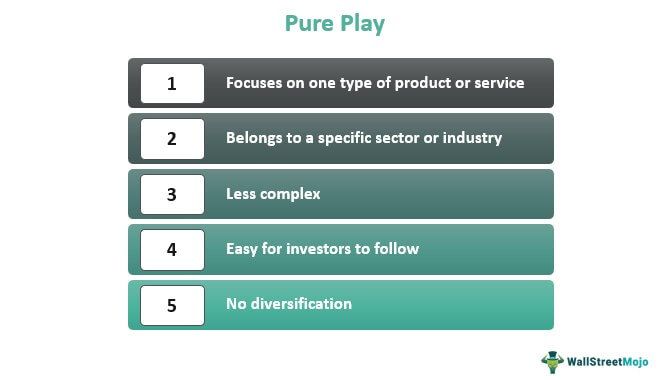Table Of Contents
Pure Play Meaning
Pure play refers to a company that concentrates on one type of product, service, business, or industry. Unlike conglomerates that generate revenue from multiple categories, such companies follow a single business approach strategy. One of the examples is an entity solely owning a chain of hamburger restaurants.

The financial statements and market performance of such companies are easy to understand. So, it is easy for investors to follow, perform fundamental analysis and make investment decisions. Furthermore, the pure play technique can be used in tandem with the capital asset pricing model to assess the cost of equity for a multidivisional firm's specific unit or division. For example, companies with a pure play strategy often adopt advanced tools like multilogin systems to streamline operations and maintain efficiency within their focused approach. It is done by deriving the beta of a public firm with operations similar to the division.
Key Takeaways
- Pure play refers to a company that concentrates on one type of product, service, business, or industry. Examples include entities owning a chain of coffeehouses and online retailers devoid of physical stores.
- Unlike diversification strategies or conglomerates generating revenue from multiple categories, its features reflect a single business approach and concentration growth strategies.
- Advantages include reduced complexity, analysis of beta coefficient, and ease of doing fundamental analysis. However, the lack of diversification points to the risk element in the model.
- Certain investors focus on identifying and following companies exhibiting a narrow focus or following a specific industry.
Pure Play Explained
Pure play companies follow a specific industry, products, or section of clients, and factors like industry development significantly influence the company's performance, market share, and growth. They concentrate on their product or service offering by investing more resources and effort to win customer loyalty and expand the market share resembling a concentration growth strategy. However, a business that started by focusing on one product or industry may expand later. At the same time, a conglomerate can sell its different subsidiaries to focus on its main business line.
Focusing on a single type of product or service is often perceived as risky compared to conglomerates that spread risk through diversification strategy. For example, companies owning a chain of movie theatres in the entertainment industry were affected by negative revenue during Covid 19 pandemic because the government imposed restrictions on cinemas and movie theatres. However, deploying streaming services accelerated from the pandemic experience can help the company lessen the impact of losing key markets by ensuring revenue from alternate options.
It is a common term among stock market participants. They use it to segregate listed companies focusing on a single line of business. When such companies get listed, the news turns buzzworthy. One of the examples is associated with the company DNEG. It is a London-based motion picture visual effects, computer animation, and stereo conversion company established in 1998. The definitive business combination agreement between DNEG and Sports Ventures Acquisition Corp. (Nasdaq: AKIC), a publicly-traded special purpose acquisition company, will result in DNEG becoming a public company and the only pure play publicly traded visual effects and animation company. Accordingly, the company will be renamed DNEG, and the ordinary shares will get listed on NASDAQ.
The venture capitalist is another example revealing the need to understand the narrow focus of this strategy. Venture capitalists can position themselves as a pure play or diversified conglomerate through their cumulative portfolios, overseeing the various firms they invest in while also undertaking portfolio optimization. If a VC opts for a "pure play" style, it optimizes venture capital engagement, and VC is called a specialist investor. In contrast, if VC selects a broader "firm" level diversification strategy, it reduces portfolio risk or possible losses, and the VC is called a generalist investor.
Example
Lennar Corp was founded in 1954, an American home construction company headquarters in Fontainebleau, Florida. In 1972, it became a public company via an IPO and was listed on NYSE. Apart from catering to residential building construction, the company takes part in other industries, like they also have activities related to credit intermediation.
In 2021, Lennar Corp revealed its plan to spin off certain businesses to concentrate on its role as a homebuilder and financial services company. Lennar Mortgage Finance, the company's commercial mortgage business, and the technology investment business are among the divisions subject to the spin-off. The spun-off enterprise's asset base will be between $3 billion and $5 billion, with no debt.
